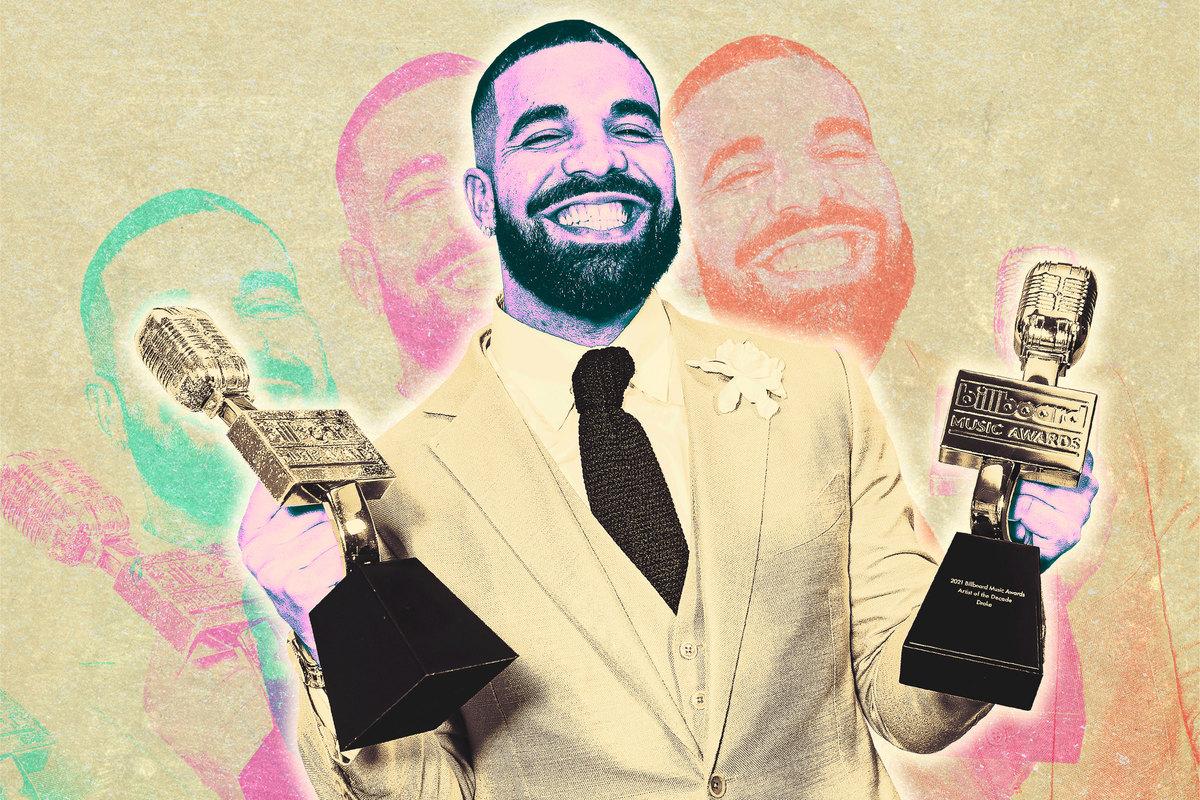
Desperation breeds motivation, sometimes obstinacy, but at least one of the two. When backed against a wall, most everybody either shifts or doubles down. So of course it would be Drake, our preeminent avatar of vacillation, who—stuck between a rock and a hard place on his most recent album, Certified Lover Boy—figured a way to do both at once. Remember, he’s always flourished in the in-between. Drake’s both a rapper and a singer, the son of a Jewish Canadian mother and a Black bluesman from Memphis, a charismatic underdog and millennial rap leviathan. Take a weak point, or at least what consumers might perceive as an incongruity, morph it into its own kind of strength, and you have the Aubrey Graham playbook.
He’s a technically brilliant rhymer; he’s built a voice that’s catchy enough to make you forget where it can’t go; The Boy moonlights as a meme whisperer; and yet, what makes Drake the most popular rap attraction of the streaming era is the way he convinces listeners that he can be two seemingly opposite things at once, no matter what those two things are. On Certified Lover Boy, Drizzy manages to run and stand in place.
It’s not like he doesn’t know what’s going on around him. His reign has coincided with the decline of the monoculture. No one in rap today sells quite like Drake (with the possible exception of the hyper-rhythmic and dour present-day Eminem), but there’s never been a time when a rapper has had to compete more for a listener’s attention. There was no streaming when Puff’s metallic jacket wrapped around the genre like an iron fist. Hov didn’t have to vie with Instagram for the focus of the masses. Today, there is more music than has ever been available, and somehow fewer ears primed to hear it.
Omens abound that his influence is contracting. The singles off Scorpion, Drake’s last studio album before Certified Lover Boy, racked up more streams than anything he’s released since. Each of his last three releases have seen slight decreases in sales. He is hypervigilant of his fit within the consumption landscape. The direction of Certified Lover Boy—the album’s nooks, peaks, and gaps—is no accident, and it cannot be understood as merely artistic whim. This project differs from the rest of his oeuvre and still remains exactly the same. It’s both a product and a statement: that Drake can change and that he doesn’t have to.
Certified Lover Boy is ostentatious in spots and furtive in others. Leapfrogging a cardiac drum loop and jumble of harmonies, Drake bends the album’s opener, “Champagne Poetry,” delightfully in his hands. On the first half of “Race My Mind,” an upbeat ditty dropped toward the back end of the project, his range blooms, fluttering in and out of octaves without a breath. There are moments on Certified Lover Boy when Drake sounds reanimated. They’re just not frequent enough to make the artist feel new, nor so infrequent that it condemns the output.
Drake has long flirted with satire to bridge the gap between mogul and public. On Certified Lover Boy, parody seeps into the music itself more than it ever has in the past. I don’t know how else to interpret the decision to flip “I’m Too Sexy”—the antiquated and lurid creation of the brothers Right Said Fred—and refurbish it as “Way 2 Sexy.” (The clause, “I’m too sexy for the trap,” spoken in the latter by the rapper Future, is so wonderfully ridiculous that it undermines the very existence of the track, making it all the more disarming and, so, appealing.) Of course, not all jokes land the same. Starting first with the much-harangued punch line of “Girls Want Girls,” Drake spends as much time trying to show us that he knows he’s trailing grease as he does performing any type of music. The characters at the core of “Papi’s Home,” a swaggering bit of wartime propaganda, or a track like the grotesque breakup note “Get Along Better” are so purposefully and identically detestable that self-flagellation ends up smoothing only so much.
None of which would condemn Certified Lover Boy if it were structured around the kinds of mega-hits that have defined Drake’s astral career. But where an album like Scorpion felt as if its second half existed to accommodate and maximize the flares of “Nice for What” and “In My Feelings,” Certified Lover Boy remains remarkably restrained. It contains a hodgepodge of songs, each so indistinguishable from the rest that beginning and end cease to matter. Nothing sticks, which can only be interpreted as purposeful—the standouts from March’s Scary Hours 2 were ripe for the picking—and, invariably, it ends up undercutting the entire affair.
Plus it’s not like he’s really retired his go-tos. The language at the base of Drake’s mythology flourishes throughout the album: There are still prepackaged IG captions (“I’ve been losin’ friends and findin’ peace,” from “Fair Trade,” a song that Drake absolutely bribed Travis Scott for), as well as generic place references (“the city” or on “the North Side”). Coasting between melody and rap on “TSU”—an ambient tune that sampled a track written by R. Kelly and sent a corner of the internet into a tizzy—Drake doubles down on the voyeurism and halfhearted concern that have long defined his narrative depictions of women. In case you missed his boast, early in the album, about sprouting from “the dirt” that haters “threw on” his name, he’s got another line nestled in the distorted iambic chaos of “7am on Bridle Path” that traces his roots straight to “the mud.” The Boy’s always loved an origin story—even if his isn’t the struggle he likes to frame it as.
And speaking of things that aren’t as they seem, this is probably where we should talk about the Kanye beef. The reason Kanye West gets seasonally flogged over his politics isn’t simply because of what they entail, it’s because he keeps telling us. Plenty of celebrities have the same opinion, some of them might even be non-white, but almost all of them keep it to themselves. Drake doesn’t do those kinds of things. Drake is cool. He’s a walking ad campaign. Focus-group tested. Engineered to maximize not just his market value but his very presence, his clout. He doesn’t just straddle the line between creating culture and feeding off it. He is the line. Drake’s public foibles are almost always based in this contradiction: He’s an act with a single bit, fixed perpetually on leveraging his performance into more power. At almost any moment, what people are criticizing Drake for is always some variation of his being inauthentic, even though his performative relatability is what made him popular in the first place.
Petty squabbles are a staple of Drake’s career (see: “You are hiding a child,” “Trigger fingers turn to Twitter fingers,” etc.). He picks his opponents carefully, and they’re usually not of his standing. The difference now is the target, the weight that Kanye still holds, the eyeballs that toying with him brings, and the fact that he can so easily be toyed with. So when, as on “No Friends in the Industry,” Drake says that “N----s love to start the beef, don’t wanna keep it rap,” well, it’s just not really believable. Because none of this—the album or the fight—has ever been strictly about bars or hooks. What’s at stake is mortality in the public eye, cultural dominance, and the entire thing reeks of opportunism. It’s not a thing that happened separate from the album, it’s part of the album, part of the grasping at straws and serial attempts to split the difference that define the very work.
And what is Certified Lover Boy if its impetus is rooted in something craven and obstinate? If the album was meant to sell more than it did—or at least work better than it does—but ended up hamstrung by the self-imposed guidelines of a pop star desperate enough to impose guidelines on himself in the first place? It may not necessarily mean the end; maybe it’s just a slipup. That pressure against your spine isn’t always a wall. Then again, it might very well be. One never really knows. If the album’s any indication, Drake isn’t going to wait around for an answer. It appears he sees something coming—if only he could figure out what to do about it.

